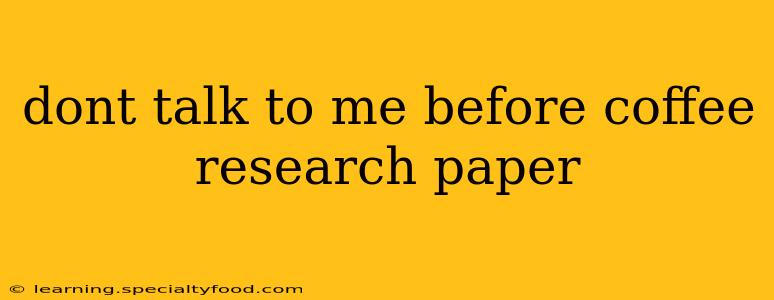Don't Talk to Me Before Coffee: A Research Paper on the Impact of Caffeine on Social Interaction
The aroma of freshly brewed coffee is a siren song for millions, a daily ritual that jumpstarts our mornings and fuels our productivity. But the impact of caffeine goes beyond mere alertness; it significantly influences our social interactions, impacting mood, communication, and even our perceived social acceptability. This research paper explores the multifaceted relationship between caffeine consumption and social behavior, examining its effects on both individual and group dynamics.
What are the effects of caffeine on the brain?
Caffeine's primary mechanism of action involves blocking adenosine receptors in the brain. Adenosine is a neurotransmitter that promotes relaxation and sleepiness. By inhibiting adenosine, caffeine triggers the release of other neurotransmitters like dopamine and norepinephrine, leading to increased alertness, energy, and focus. This boost in brain activity, however, can have profound implications for social interaction.
How does caffeine affect social anxiety?
While caffeine can enhance sociability in some individuals, it can exacerbate social anxiety in others. For those already prone to anxiety, the stimulant effects of caffeine can amplify feelings of nervousness, self-consciousness, and apprehension in social settings. This heightened anxiety can manifest as increased heart rate, sweating, and difficulty engaging in conversation. The impact is highly individual, dependent on factors such as genetic predisposition, caffeine tolerance, and the severity of pre-existing anxiety.
Does caffeine improve or impair social skills?
The effect of caffeine on social skills is complex and not universally positive. In low to moderate doses, caffeine can improve cognitive functions like attention and processing speed, potentially leading to more focused and engaging conversations. Individuals might feel more confident and articulate, facilitating smoother social interactions. However, excessive caffeine intake can lead to jitters, restlessness, and even irritability, hindering effective communication and potentially damaging social relationships. The "sweet spot" for optimal social performance varies significantly between individuals.
Can caffeine addiction affect social life?
Caffeine addiction, while not officially recognized as a substance use disorder by all medical bodies, can significantly impact social life. Individuals heavily reliant on caffeine may experience withdrawal symptoms such as headaches, fatigue, and irritability when they don't consume their regular dose. This dependency can lead to scheduling conflicts, strained relationships, and even social isolation as individuals prioritize caffeine intake over other social engagements. Moreover, the unpredictable mood swings associated with caffeine withdrawal can damage social harmony and compromise relationships.
What are the long-term effects of caffeine on social behavior?
The long-term effects of regular caffeine consumption on social behavior are still under investigation. While some studies suggest a potential correlation between high caffeine intake and increased risk of social anxiety disorders, more research is needed to establish causality. Long-term effects are also likely to be influenced by a variety of individual factors, including overall health, dietary habits, and other lifestyle choices. Further research exploring the interaction between caffeine, genetics, and social behavior is crucial for a comprehensive understanding.
Conclusion
The relationship between caffeine and social interaction is intricate and multifaceted. While moderate caffeine consumption can potentially enhance alertness and facilitate smoother communication, excessive intake can lead to anxiety, irritability, and even addiction, negatively impacting social life. Understanding the individual variability in response to caffeine is essential for navigating its impact on social behavior effectively. Further research is critical to clarify the long-term effects and individual-specific factors influencing this complex relationship. Ultimately, responsible caffeine consumption, coupled with self-awareness and mindful social engagement, contributes to healthier and more fulfilling social interactions.
